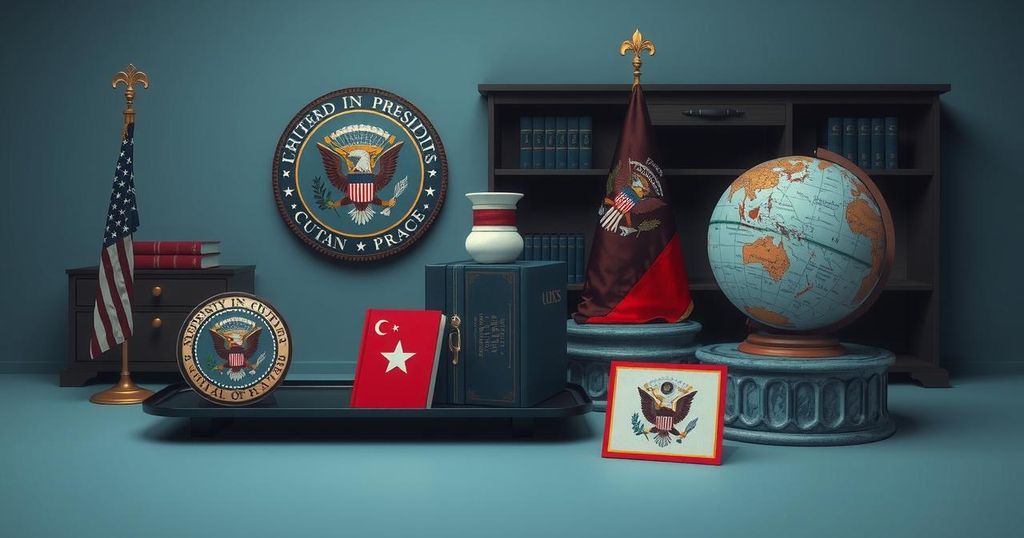Turbulent Changes in Trump’s Iran Deal Strategy

President Trump’s turbulent first 100 days saw significant personnel changes, with national security adviser Mike Waltz resigning amid controversy. He was quickly nominated for U.N. ambassador, while Secretary of State Marco Rubio temporarily assumed Waltz’s duties, complicating the administration’s Iran negotiations. The ultimate goal remains preventing Iran from acquiring nuclear weapons, necessitating robust diplomatic strategies, or, if necessary, military actions.
In his recent campaign rally in Michigan, President Donald Trump marked his first 100 days in office. This period was described as possibly the fastest and most chaotic in modern political history, and judging by recent personnel shakeups, the next days could be equally tumultuous.
On a surprising note last Thursday, national security adviser Mike Waltz and his deputy, Alex Wong, stepped down from their roles. The circumstances around these departures suggest they weren’t entirely voluntary. Frustrations had been brewing, notably within the Pentagon, after a messaging blunder known as “Signalgate,” which involved an unintended leak regarding military discussions about Iranian proxies in Yemen.
Despite the controversy surrounding Signalgate, Trump quickly announced that Waltz would instead be nominated as U.S. ambassador to the United Nations. Waltz, a decorated veteran and the first Army Special Forces soldier elected to Congress in 2018, appears to have maintained Trump’s favor, transitioning to a position that some might argue holds equal or greater prestige than national security adviser.
In an equally surprising turn, Secretary of State Marco Rubio, known for his tough stance on Iran, will also temporarily take over as national security adviser. Speculations that Middle East envoy Steve Witkoff might fill the role turned out to be just that. For now, Witkoff continues to oversee critical nuclear negotiations with Iran while Rubio juggles multiple top foreign policy positions.
This shakeup raises questions about the internal dynamics of the Trump administration, especially considering that Waltz had faced significant Pentagon pushback. Perhaps Trump saw moving Waltz to New York City as a necessary measure, especially as the U.N. role involves dealing with persistent challenges against the likes of Iran’s leadership. However, having Rubio in a dual role during such pivotal negotiations adds complexity and offers insight into the administration’s sometimes confusing foreign policy approach.
The crux of the Iran negotiations depends heavily on Trump himself. While erstwhile advisers matter, ultimately it’s the President’s stance and decisions that dictate the course of action. Trump, despite his history as a dealmaker, is confronted with the reality that a mere agreement with Iran should not be the primary focus.
On one hand, Trump seems to favor securing a deal to avert ongoing conflicts framed as “forever wars.” Yet on the other, he’s undoubtedly aware of Iran’s previous attempts on his life and its ongoing threats. It’s this balancing act of pragmatism versus caution in dealing with an adversarial regime that adds layers to his approach.
The paramount objective should be clear: preventing Iran, a consistent state supporter of terrorism, from obtaining nuclear weapons. This means avoiding the temptation to settle for any deal that lacks substance. Ensuring that Iran’s nuclear program is not just contained but dismantled should be the focus.
While there might be potential for a diplomatic resolution, the option of military action remains. Nobody favors conflict over diplomacy, and there may very well be a deal worth making. However, the stakes are too high for a simplistic approach. It’s essential to differentiate between tactics and goals, particularly when facing a regime that poses significant global threats. The next moves by Trump could define not just his presidency, but impact global security for years to come.
As the Trump administration navigates through complex foreign policy challenges, particularly concerning Iran, recent personnel changes highlight the ongoing turmoil within the White House. With Trump’s dual emphasis on striking a deal and preventing nuclear armament, future actions must balance diplomacy with the higher goal of ensuring global safety. The stakes have never been higher, and the implications of these decisions will resonate far beyond the current administration.
Original Source: www.journal-news.net







